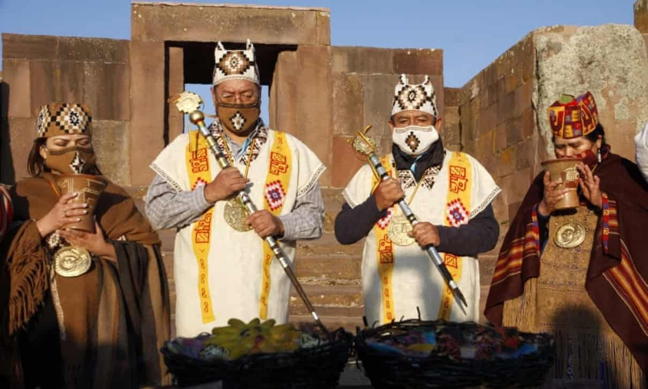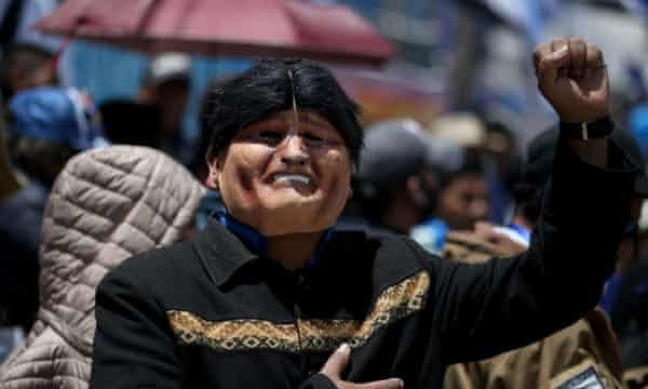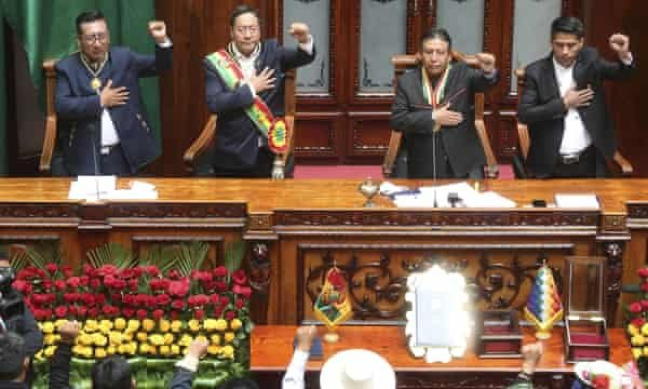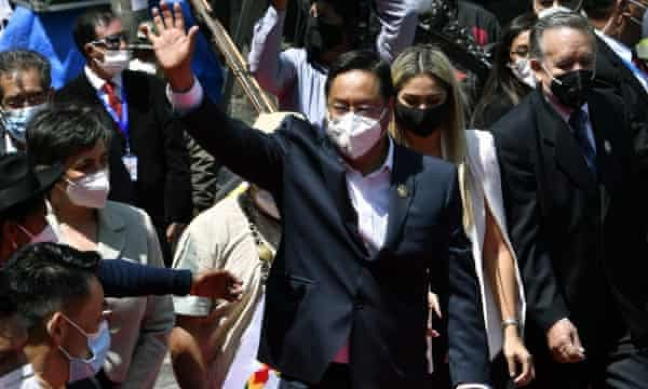
Bolivia's new leftwing president: 'We have reclaimed democracy'
November 8, 2020 - Original article: The Guardian
Luis Arce takes power after landslide win for Movement for Socialism, but experts predict bumpy road ahead
Tom Phillips Latin America correspondent
Bolivia’s new president, Luis Arce, has vowed to rebuild his country’s battered economy, revive ties with leftwing neighbours and serve one term only, as he prepared to take office after October’s landslide election.
Speaking to the Guardian before his inauguration on Sunday, the UK-educated economist was cautious about characterising his victory as proof that Latin America’s leftwing “pink tide” of the early 2000s was bouncing back after a period of rightwing dominance. Since 2018 the left has returned to power in Mexico and Argentina, while a leftwing economist is well placed to win Ecuador’s presidential election in February.
More on this topic:
Evo Morales to return from exile to Bolivia in 800-vehicle convoy
But Arce’s win did represent a sensational domestic resurrection for the Movement for Socialism (Mas) party, which some observers thought was doomed after its figurehead, Evo Morales, was driven abroad last year after a failed election, social unrest and what supporters call a US-backed coup. “The left is not defeated in Bolivia – on the contrary, we have a new opportunity now to work for the Bolivian people,” the incoming president said.
(below) A Mas supporter in an Evo Morales mask celebrating Luis Arce’s general election victory during a rally in El Alto in October. Photograph: Luis Gandarillas/AFP/Getty

Arce, 57, said his emphatic first-round win showed Latin Americans would no longer accept anti-democratic, rightwing regimes, such as the interim government that took power after Morales abandoned Bolivia in November 2019. “We have reclaimed democracy for Bolivia, and our message is that we will not tolerate any kind of de facto dictatorial regime or coup in Latin America,” he said, promising to seek justice for the victims of a shooting of unarmed civilians at the height of last year’s unrest.
He promised to repair ties with Argentina’s Peronist leaders and restore relations with the leftwing governments of Cuba and Venezuela, which Bolivia’s conservative interim president, Jeanine Áñez, severed, despite lacking a democratic mandate. He said Juan Guaidó, the Trump-backed Venezuelan opposition leader who has been trying to topple Venezuela’s president, Nicolás Maduro, since declaring himself the country’s rightful leader in January 2019, “represents no one”.
(below) Luis Arce, centre left, and Vice-President David Choquehuanca, centre right, sing the national anthem on their inauguration day at Congress in La Paz. Photograph: Jorge Mamani/AP

But Arce also signalled he would be pragmatic, “leaving matters of ideology and politics to one side” when dealing with leaders of different stripes, such as Brazil’s far-right president, Jair Bolsonaro. “We want to do good business with our neighbours,” he said.
On Sunday morning thousands of supporters gathered outside the legislative assembly in La Paz to see Arce sworn in. As Bolivia’s green, yellow and red presidential sash was placed over his shoulders, they chanted their new leader’s nickname: “Lucho! Lucho! Lucho! Lucho!”
Guests included Argentina’s leftwing leader Alberto Fernández and Venezuela’s foreign minister Jorge Arreaza. But the conservative presidents of Colombia and Paraguay, Iván Duque and Mario Abdo Benítez, also flew in.
“We are starting a new phase in our history,” Arce told them, promising to govern “for all” Bolivia’s people.
(below) Luis Arce waves upon arrival at Murillo square in La Paz on Sunday for his swearing-in ceremony. Photograph: Aizar Raldes/AFP/Getty Images

Experts see a bumpy road ahead for Arce, with Bolivia still reeling from the humanitarian and economic impact of one of the world’s worst coronavirus outbreaks. Its Covid-19 death rate per million people is currently the fifth highest in the world, higher than that of the US and Mexico.
“I wouldn’t expect any kind of honeymoon,” said Eduardo Gamarra, a Bolivia expert at Florida International University. He said painful austerity measures with the potential to cause “social turmoil” were unavoidable.
Arce, who has a master’s from Warwick University, where he studied in the 90s on a British government scholarship, said the economic outlook was bleak, with GDP falling 11% this year and unemployment as high as 30% in sectors such as construction.
“The first thing we must do is get Bolivia out of this economic crisis. The great majority of Latin America countries are suffering from this right now, but particularly Bolivia … So we must rebuild the economy.”
Arce faces political tests too, not least in the shape of Morales, who is planning a triumphant homecoming from exile in Argentina on Monday. “His big challenge now is how long he can keep Evo out of the picture,” Gamarra said.
Asked whether it was the right moment for Morales to return, Arce said: “He will make that decision. We won’t interfere in his decisions … and of course we will not stop him … It’s a very personal matter for him.”
However, Morales would have no formal role in his administration, Arce said. “This is my government. Comrade Evo is the Mas president and that will be his role … But I will lead the government.”
Morales caused anger last year, even in Mas, for ignoring a referendum and seeking a fourth term in an attempt to extend his 14 years in power.
Arce said he did not plan to remain in office as long, and hoped to see a “renewal” of his party with the emergence of a new generation of leaders. “I want to spend five years [in office] and no more,” he said.
Jim Shultz, the founder of the Bolivia-focused Democracy Center, said that was not necessarily how things would turn out. “Let’s see what happens, because the constitution gives him the option of a second [term],” he said. “Of course he would say that at the beginning.”